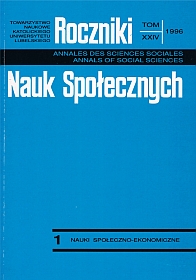Liberalizm a religia
Abstrakt
The relationship between capitalist liberalism and religion is an object of controversy. Some (Max Weber) link capitalism and liberalism with Protestantism, others with Judaism (W. Sombart), and still others with Catholicism (A. de Tocqueville, M. Novak). Some (Paul Tillich) speak about the contradictions in both trends. The founders of liberalism, with Th. Hobbes and J.J. Rousseau at their lead, as well as its contemporary exponents continue the traditions of rationalism and naturalism of the Enlightenment. In principle they do not question religion, but they 1) sympathize with deism, question the fact of Revelation and accept the naturalistic interpretation of Christianity (Rousseau was the mouthpiece of "civil religion"); 2) in the name of the state neutrality in matters of one's outlook on life they question the social profile of religion and tend to make it entirely a matter of "private concern"; 3) while referring to the slogans of pluralism and tolerance, they in fact promote religious and axiological relativism; 4) in the name of individual freedom they postulate that law and ethos (especially the one of Christian inspiration) be separated. Ideological liberalism promotes in fact a fundamentalism of indifferentism and agnosticism.
Copyright (c) 1996 Roczniki Nauk Społecznych

Utwór dostępny jest na licencji Creative Commons Uznanie autorstwa – Użycie niekomercyjne – Bez utworów zależnych 4.0 Międzynarodowe.


